Arama
Hande ALPASLAN | |||
Ayşegül BATIR Yönetici Asistanı Tel: (312) 298 1060 Tel: (312) 468 5300/1060 | Melis YURTTAGÜL KOCATÜRK BTY Politikaları Tel: (312) 298 1062 |
BTY Destek Programları Planlama ve Tel: (312) 298 1060 | Selcan ZEREN KARABULUT BTY Veri Analizi ve Değerlendirme Müdürü Tel: (312) 298 1080 |
Dr. Özlem DOĞAN Tel: (312) 298 1072 | Dr. Fatih Sinan ESEN Tel: (312) 298 1146 | Dr. Samet HACILAR Tel: (312) 298 1066 | Pınar KAHRAMAN DİLEK Tel: (312) 298 1065 |
Dr. Sümeyra KARA Tel: (312) 298 1075 | Turgut KIRCI Tel: (312) 298 1094 | Dr. Duygu SARAÇOĞLU Tel: (312) 298 1077 | Nazlı SARIASLAN Bilimsel Programlar Başuzmanı Tel: (312) 298 1083 |
Şeyda AYAN ÖZBEK Tel: (312) 298 1092 | Ayşegül GÜNEL ARAS Tel: (312) 298 1071 | Hasan KURTAR Tel: (312) 298 1084 | Özlem SEZER KINIK Tel: (312) 298 1072 |
Ömer Furkan SİRKECİ Tel: (312) 298 1086 | Nihan TILTAK Tel: (312) 298 1076 | Sema KARABULUT Tel: (312) 298 1085 | Mehmet İmran AKSU Tel: (312) 298 1070 |
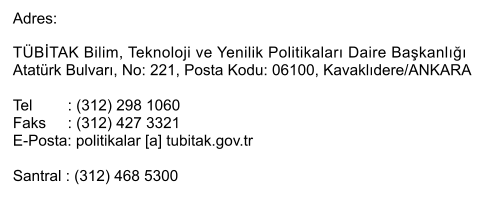
Hayır, söz konusu projeler limitler dışında tutulmaktadır.
Sabahat Yazıcı
Evet, söz konusu projeler de 1002 başvuru limitlerine dahildir.
PBS’de yer alan ARDEB Proje Görevlerim menüsünden projenizin durumunu takip edebilirsiniz. Ayrıca, Projenizin durumuna ilişkin olumlu veya olumsuz tüm değişiklikler (iade, destek kararı, ret kararı) tarafınıza e-posta ile iletilmektedir.
Proje Sonuç Raporu Yazımında Uyulması Gereken Kurallar için tıklayınız.
Hayır, Hızlı Destek projelerine yurt dışı araştırmacı/danışman eklenememektedir.
Hayır, Hızlı Destek projeleri için Proje Teşvik İkramiyesi verilmemektedir.
1004-Mükemmeliyet Merkezi Destek Programının program hakkındaki bilgileri, duyuruları, etkinlikleri ve desteklenen platformların bilgilerine erişim imkânı sağlayan 1004 Programına özel olarak tasarlanmış web sayfası 1004.tubitak.gov.tr adresinden 2 Nisan 2024 tarihi itibarıyla kullanıma açılmıştır.
1004- Mükemmeliyet Merkezi Destek Programında, araştırma ekosisteminin geliştirilmesi ve kurumlar arası iş birliğinin kolaylaştırılması amacıyla İş Birliği Oluşturma Modülü tasarlanmıştır.
İş birliği oluşturma modülü ile; 1004 platformlarına kurum eklemek isteyen yönetici kuruluşlar/yönetici kuruluş adayları platformlarına kurum eklemek için ilan verebilecek; herhangi bir platforma dahil olmak isteyen kurumlar ise bilgilerini bu modül aracılığıyla paylaşabileceklerdir. Ayrıca, iş birliği modülü üzerinden sorgulama yapılabilecektir. İş birliği modülüne 1004 web sayfası üzerinden ulaşabilirsiniz.
Modül ile ilgili geri bildirimlerinizi 1004@tubitak.gov.tr adresi üzerinden iletebilirsiniz.
Şekilsel yönden eksikliği nedeni ile iade edilen projeler için "Proje Değişiklik Bildirim Formu" doldurmanız gerekmez.
2022 Yılı TÜBİTAK Ödülleri Açıklandı!
TÜBİTAK’ın bilimsel ve teknolojik alanlarda araştırma ve geliştirme faaliyetlerini desteklemek, bilim insanlarının, araştırıcıların yetiştirilmeleri ve geliştirilmeleri için imkân sağlamak amacıyla verdiği “TÜBİTAK Bilim, Özel, Hizmet ve Teşvik Ödülleri”ne ilişkin 2022 yılı değerlendirme çalışmaları sonuçlandı. TÜBİTAK Yönetim Kurulu tarafından 2022 yılında 2 Bilim Ödülü, 1 Hizmet Ödülü ve 11 Teşvik Ödülü verilmesine karar verildi.
TÜBİTAK Yönetim Kurulu tarafından ödül tevcih edilen bilim insanları:
BİLİM ÖDÜLÜ
MÜHENDİSLİK BİLİMLERİ
Prof. Dr. Vural GÖKMEN
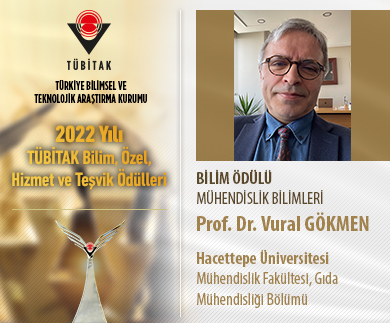
“Gıda bilimi ve mühendisliği alanında, gıdaların işlenmesi sırasında ortaya çıkan gıda güvenliği risklerinin izlenmesine yönelik ileri analiz tekniklerinin ve gıda güvenliği risklerinin azaltılmasına yönelik gıda işleme teknolojilerinin geliştirilmesi konularındaki üstün nitelikli çalışmaları” nedeniyle Bilim Ödülü verilmiştir.
Anabilim Dalı: Gıda Mühendisliği
Araştırma Alanları: Gıda Bilimleri ve Teknolojisi
Görev Yeri: Hacettepe Üniversitesi, Mühendislik Fakültesi, Gıda Mühendisliği Bölümü
Daha fazla bilgi için: https://avesis.hacettepe.edu.tr/vgokmen
BİLİM ÖDÜLÜ
SAĞLIK BİLİMLERİ
Prof. Dr. Fatih ÖZALTIN
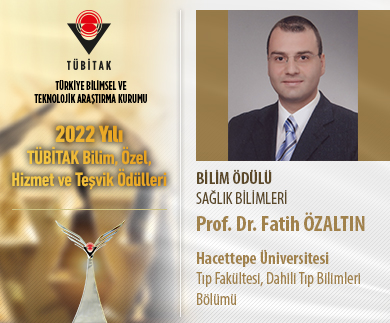
“Kalıtsal böbrek hastalıkları alanında; böbrek hastalıklarının patogenezinin daha iyi anlaşılması, bunlara yönelik bireyselleştirilmiş tedavi yaklaşımlarının geliştirilmesi ve aynı zamanda normal böbrek fizyolojisinin de daha iyi anlaşılması konularındaki üstün nitelikli çalışmaları” nedeniyle Bilim Ödülü verilmiştir.
Anabilim Dalı: Çocuk Sağlığı ve Hastalıkları
Araştırma Alanları: Pediatrik, Üroloji&Nefroloji, Tıp, Araştırma&Deneysel, Genetik&Kalıtım
Görev Yeri: Hacettepe Üniversitesi, Tıp Fakültesi, Dahili Tıp Bilimleri Bölümü
Daha fazla bilgi için: www.fatihozaltin.com
HİZMET ÖDÜLÜ
SOSYAL VE BEŞERİ BİLİMLER
Prof. Dr. Şaban Teoman DURALI (Merhum)
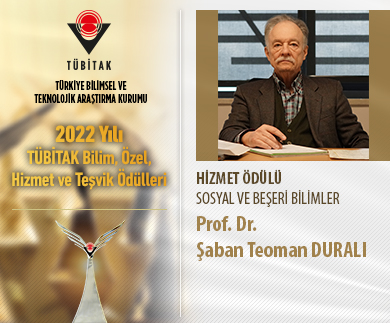
“Bilim insanı yetiştirmesi, mensup olduğu bilim dalının kurumsallaşmasında ve Türkiye’deki bilimsel atılımların gerçekleşmesinde önemli rol oynaması” nedeniyle Merhum Prof. Dr. Şaban Teoman DURALI’ya TÜBİTAK Hizmet Ödülü verilmesi uygun bulunmuştur.
Anabilim Dalı: Felsefe
Araştırma Alanları: Mantık, Eskiçağ Felsefe Tarihi, Yeniçağ Avrupa Felsefe Tarihi, Türk-İslâm Düşüncesi Tarihi, Bilgi-Bilim Teorileri (Epistemoloji), Karşılaştırmalı Dinler Tarihi, İslâm Dininin Tarihî Gelişimi, Antropoloji, Hücre Fizyolojisi, İnsan Fizyolojisi, Anatomi, Evrim, Genetik
TEŞVİK ÖDÜLÜ
TEMEL BİLİMLER
Doç. Dr. Mehmet YAĞMURCUKARDEŞ
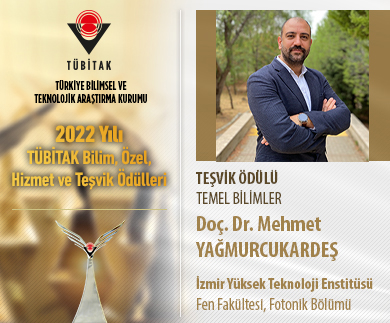
“Malzeme bilimi ve yoğun madde fiziği alanında; malzemelerin yapısal, elektronik, titreşimsel ve piezoelektrik özelliklerinin kuramsal yolla ön görülmesi ve incelenmesi konularındaki üstün nitelikli çalışmaları” nedeniyle Teşvik Ödülü verilmiştir.
Anabilim Dalı: Fizik
Araştırma Alanları: Fizik, Katı Hal
Görev Yeri: İzmir Yüksek Teknoloji Enstitüsü, Fen Fakültesi, Fotonik Bölümü
TEŞVİK ÖDÜLÜ
MÜHENDİSLİK BİLİMLERİ
Prof. Dr. Evren MUTLUGÜN
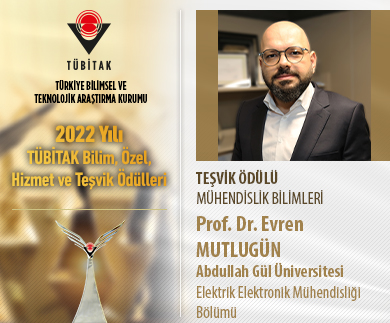
“Mühendislik alanında nanoteknoloji, optoelektronik aygıtlar ve ışık hasadı konularındaki uluslararası düzeyde üstün nitelikli çalışmaları” nedeniyle Teşvik Ödülü verilmiştir.
Anabilim Dalı: Elektronik
Araştırma Alanları: Nanobilim ve Nanoteknoloji, Mühendislik, Elektrik ve Elektronik, Fizik, Uygulamalı, Malzeme Bilimleri
Görev Yeri: Abdullah Gül Üniversitesi, Mühendislik Fakültesi, Elektrik Elektronik Mühendisliği Bölümü
Daha fazla bilgi için: https://avesis.agu.edu.tr/evren.mutlugun
TEŞVİK ÖDÜLÜ
MÜHENDİSLİK BİLİMLERİ
Doç. Dr. Mehmet Cengiz ONBAŞLI
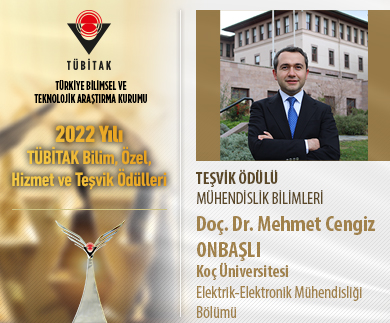
“Nanoelektronik, nano-optik, nanomanyetik malzeme ve aygıtlar alanında; dünyanın en düşük Gilbert sönümleme sabitine sahip manyetik yalıtkan demir garnet filmlerin üretimi ve düşük güç tüketimine sahip 2 boyutlu spintronik aygıtların geliştirilmesi konularındaki üstün nitelikli çalışmaları” nedeniyle Teşvik Ödülü verilmiştir.
Anabilim Dalı: Optik, Elektronik ve Manyetik Malzeme ve Nano aygıtlar- Elektrik-Elektronik Mühendisliği
Araştırma Alanları: Bilgisayar Bilimleri, Donanım ve Mimari, Disiplinler Arası Uygulamalar, Elektrik ve Elektronik, Ortak Disiplinler, Malzeme Bilimleri, Seramik, Özellik ve Test
Görev Yeri: Koç Üniversitesi, Mühendislik Fakültesi, Elektrik-Elektronik Mühendisliği Bölümü
Daha fazla bilgi için: https://kuttam.ku.edu.tr/en/our-staff/academic-staff/faculty-members/mehmet-cengiz-onbasli/
TEŞVİK ÖDÜLÜ
MÜHENDİSLİK BİLİMLERİ
Prof. Dr. Mehmet Lütfi YOLA
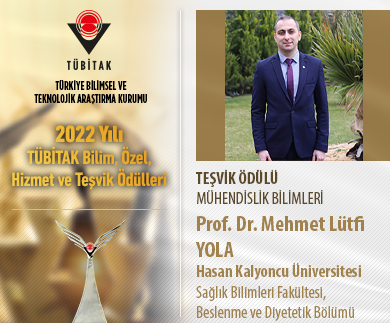
“Analitik kimya, eczacılık, biyomedikal mühendisliği alanında genel anlamda ilaç, kan, idrar, gıda, su (içme suyu, çeşme suyu ve atık sular) gibi gerçek numune ortamlarında önemli analitlerin veya hedef moleküllerin mikro ya da nano seviyelerinde hassas tayinine yönelik sensör/biyosensörlerin tasarımı ve validasyon konularındaki üstün nitelikli çalışmaları” nedeniyle Teşvik Ödülü verilmiştir.
Anabilim Dalı: Analitik Kimya
Araştırma Alanları: Kimya, Analitik Metot Geliştirme, Biyomedikal Mühendisliği, Malzeme Bilimi
Görev Yeri: Hasan Kalyoncu Üniversitesi, Sağlık Bilimleri Fakültesi, Beslenme ve Diyetetik Bölümü
Daha fazla bilgi için: https://profil.hku.edu.tr/akademik/mehmet-lutfi-yola/
TEŞVİK ÖDÜLÜ
SAĞLIK BİLİMLERİ
Prof. Dr. Özge ÇEVİK
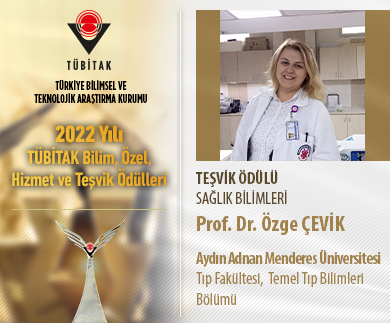
“Biyokimya ve farmakoloji alanında; kanser ilaç mekanizmaları, yenilikçi ilaç taşıyıcı sistemler, teşhis ve tedavi yanıtı için yeni biyobelirteçler konularındaki uluslararası düzeyde üstün nitelikli çalışmaları” nedeniyle Teşvik Ödülü verilmiştir.
Anabilim Dalı: Tıbbi Biyokimya
Araştırma Alanları: Biyokimya ve Moleküler Biyoloji, Farmakoloji, Eczacılık, Üroloji, Fizyoloji
Görev Yeri: Aydın Adnan Menderes Üniversitesi, Tıp Fakültesi, Temel Tıp Bilimleri Bölümü
Daha fazla bilgi için: https://akbis.adu.edu.tr/personel_detay.asp?sno=A-3079
TEŞVİK ÖDÜLÜ
SAĞLIK BİLİMLERİ
Doç. Dr. Fatih KOCABAŞ
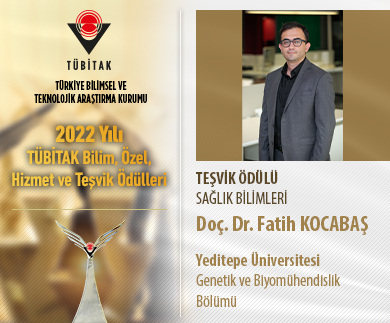
“Biyokimya, moleküler biyoloji, kök hücre çoğaltma teknolojileri, yeni etken madde ve RNA teknolojilerin geliştirilmesi, gen düzenleme ve kalp rejenerasyonu mekanizmaları” konularındaki üstün nitelikli çalışmaları nedeniyle Teşvik Ödülü verilmiştir.
Anabilim Dalı: Biyokimya ve Moleküler Biyoloji
Araştırma Alanları: Biyokimya ve Moleküler Biyoloji, Hücre Biyolojisi, Hücre ve Doku Mühendisliği, Tıbbi Kimya, Hematoloji, Onkoloji, Kalp ve Kalp Damar Sistemi
Görev Yeri: Yeditepe Üniversitesi, Mühendislik Fakültesi, Genetik ve Biyomühendislik Bölümü
Daha fazla bilgi için: http://regbio.yeditepe.edu.tr/
TEŞVİK ÖDÜLÜ
SAĞLIK BİLİMLERİ
Doç. Dr. İlyas Çağlar YILGÖR
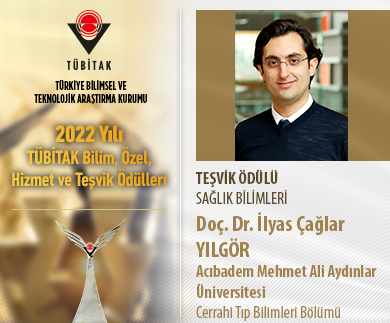
“Omurga cerrahisine getirmiş olduğu yenilikçi ve öncü yaklaşımları, geliştirilen GAP Skoru ile kişiye özel analiz ve tedavi yöntemlerinin planlanmasındaki üstün nitelikli çalışmaları” nedeniyle Teşvik Ödülü verilmiştir.
Anabilim Dalı: Ortopedi ve Travmatoloji
Araştırma Alanları: Tıp, Çeşitli Sağlık Bilimleri ve Hizmetleri, Cerrahi
Görev Yeri: Acıbadem Mehmet Ali Aydınlar Üniversitesi, Tıp Fakültesi, Cerrahi Tıp Bilimleri Bölümü
Daha fazla bilgi için: https://avesis.acibadem.edu.tr/caglar.yilgor
TEŞVİK ÖDÜLÜ
SOSYAL VE BEŞERİ BİLİMLER
Doç. Dr. Sabahat Çiğdem BAĞCI
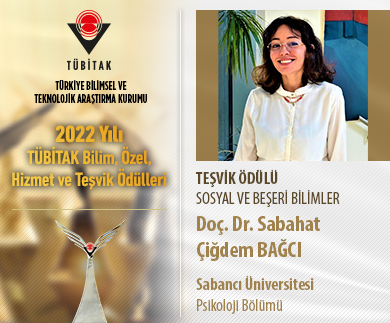
“Sosyal psikoloji alanında; gruplar arası süreçler, gruplar arası temas, ön yargı ve sosyal kimlikler konularındaki üstün nitelikli çalışmaları” nedeniyle Teşvik Ödülü verilmiştir.
Anabilim Dalı: Psikoloji
Araştırma Alanları: Sosyal Psikoloji
Görev Yeri: Sabancı Üniversitesi, Sanat ve Sosyal Bilimler Fakültesi, Psikoloji Bölümü
Daha fazla bilgi için: https://fass.sabanciuniv.edu/tr/sabahat-cigdem-bagci
TEŞVİK ÖDÜLÜ
SOSYAL VE BEŞERİ BİLİMLER
Doç. Dr. Eyüp DOĞAN
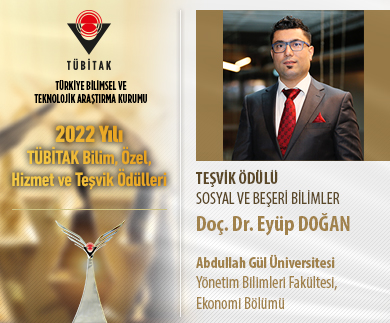
“Enerji ekonomisi, çevre ekonomisi ve sürdürülebilir kalkınma konularındaki uluslararası düzeyde üstün nitelikli çalışmaları” nedeniyle Teşvik Ödülü verilmiştir.
Anabilim Dalı: İktisat, İktisat Teorisi
Araştırma Alanları: İktisat, Ekonomi
Görev Yeri: Abdullah Gül Üniversitesi, Yönetim Bilimleri Fakültesi, Ekonomi Bölümü
Daha fazla bilgi için: https://avesis.agu.edu.tr/eyup.dogan/
TEŞVİK ÖDÜLÜ
SOSYAL VE BEŞERİ BİLİMLER
Dr. Öğr. Üyesi Maissam NİMER
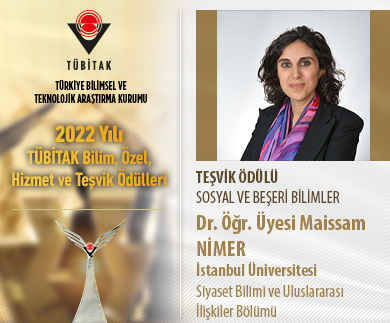
“Sosyoloji alanında; göç, kamu politikaları, cinsiyet eşitsizliği ve kalkınma konularındaki üstün nitelikli çalışmaları” nedeniyle Teşvik Ödülü verilmiştir.
Anabilim Dalı: Sosyoloji
Araştırma Alanları: Göç, Kamu Politikaları, Cinsiyet, Eşitsizlik, Kalkınma
Görev Yeri: İstanbul Üniversitesi, Siyasal Bilgiler Fakültesi, Siyaset Bilimi ve Uluslararası İlişkiler Bölümü
Daha fazla bilgi için: https://avesis.istanbul.edu.tr/mnimer
TEŞVİK ÖDÜLÜ
SOSYAL VE BEŞERİ BİLİMLER
Doç. Dr. Kemal YILDIZ
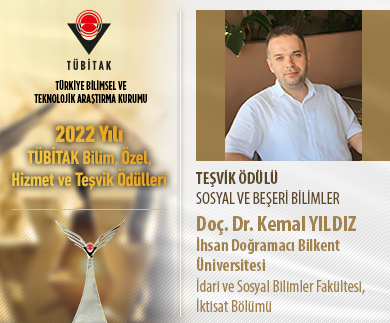
“İktisat kuramı (teorisi) alanında; oyunlar kuramı ve mekanizma tasarımı, kısmi rasyonel seçim modelleri ve adil eşleştirmeler konularındaki üstün nitelikli çalışmaları” nedeniyle Teşvik Ödülü verilmiştir.
Anabilim Dalı: İktisat
Araştırma Alanları: İktisat
Görev Yeri: İhsan Doğramacı Bilkent Üniversitesi. İktisadi, İdari ve Sosyal Bilimler Fakültesi, İktisat Bölümü
Daha fazla bilgi için: http://econ.bilkent.edu.tr/?page_id=1075&nvaf_id=87&lang=tr
2021 ödül alanlar
2020 ödül alanlar Başvurusu
2019 ödül alanlar Başvurusu Sonuçları
The 2024 Call of the Chips Joint Undertaking (JU), which is supported under the Horizon Europe Programme, has been published.
Call Scope:
In 2024, the Chips JU will launch three calls for proposals for the non-initiative part of the programme:
A first call for Innovation Actions (higher TRLs) and will consist of a global topic and 2 focus topics and run in 2 phases
A second call for Research and Innovation Actions (lower TRLs) and will consist of a global topic and run in 2 phases.
A third call will include one topic for Research and Innovation Actions (RIA) that will be implemented as one phase call without national contribution but in cooperation with South Korea (ROK).
HORIZON-Chips 2024-1-IA
HORIZON-Chips 2024-1-IA-T1 “Global call according to SRIA 2024”
HORIZON-Chips 2024-1-IA-T2 “High Performance RISC-V Automotive Processors supporting SDV”
HORIZON-Chips 2024-1-IA-T3 “Service Oriented Framework for the Software Defined Vehicle of the future"
HORIZON-Chips 2024-2-RIA
HORIZON-Chips 2024-2-RIA-T1 “Global call according to SRIA 2023”
HORIZON-Chips 2024-2-RIA-T2 “Sustainable and greener manufacturing”
HORIZON- Chips 2024-3-RIA
HORIZON- Chips 2024-3-RIA “Joint call with Korea on Heterogeneous integration and neuromorphic computing technologies for future semiconductor components and systems”
The international consortium that will present the project should consist of 3 different institutions from at least 3 different countries. To reach the international call text, find project partners, access application guides and make an international project application through the "Funding and Tenders Portal" https://www.chips-ju.europa.eu/noninitiative/ page should be visited.
In addition to the international project applications to be submitted to the call secretariat, it is obligatory to submit a national project application to TUBITAK by researchers who would like to take part in the projects from Türkiye. You can find the national application rules here.
Call Calendar
The Calls HORIZON-Chips 2024-1-IA and HORIZON-Chips 2024-2-RIA will be two-stage calls
International Applications:
Deadline (Project Outline (PO) phase): at 17:00 Brussels time on 14 May 2024
Deadline (Full Project Proposal (FPP) phase): at 17:00:00 Brussels time on 17 September 2024
TUBITAK Applications:
First Stage Deadline: 23:59 İstanbul time on 21 May 2024
Second Stage: applicable for funded projects after FPP phase, date will be announced by TUBITAK.
The Call HORIZON- Chips 2024-3-RIA will be single-stage calls with submission of Full Project Proposal (FPP): Only international application.
Deadline (FPP proposals): at 17:00 Brussels time on 14 May 2024
Related Experts
For information on International Application Conditions:
Dr. Özlem GEZİCİ KOÇ / Hasan Burak TİFTİK
UIDB – EU Framework Programs Directorate
E-mail: ncpdis@tubitak.gov.tr
For information about the National Application Requirements and the 1071 Program:
Tayyip KÖSOĞLU
ARDEB International Cooperation Projects Research Support Group (UPAG)
E-mail: tayyip.kosoglu@tubitak.gov.tr
Ufuk Avrupa Programı kapsamında desteklenen Ortak Girişimler'den biri olan Key Digital Technologies (KDT) Ortak Girişimi yeni adıyla ve genişletilmiş kapsamıyla Chips Ortak Girişimi olarak devam etmektedir. Chips Ortak Girişimi Avrupa yarı iletken teknolojisi ekosistemindeki araştırma, geliştirme ve imalat kapasitesini destekleyen bir kamu-özel ortaklığı olma özelliğini taşımakta olup KDT Ortak Girişimi’nin elektronik bileşenler ve sistemler hakkında devam eden faaliyetlerini aynı şekilde desteklemeyi sürdürmektedir. KDT Ortak Girişimi ile desteklenmesi amaçlanan çalışmalar, Chips Ortak Girişimi altında “Avrupa için Çip Girişimi-Chips for Europe Initiative” kapsamında olmayan aktiviteler olarak geçmekte ve “Non-Initiative” olarak kodlanmaktadır.
Çağrı Kapsamı:
Chips Ortak Girişimi kapsamında KDT çağrılarının aynı şekilde devam edeceği “Non-Initiative” kısmına ait 2024 yılındaki ilk üç çağrı aynı anda açılmıştır:
İnovasyon Aksiyonu (Innovation Action, IA) için ilk çağrı 1 genel konu (bottom-up) ile 2 odak konudan oluşacak ve 2 aşamada gerçekleştirilecektir.
Araştırma ve İnovasyon Aksiyonu (Research and Innovation Action, RIA) için ikinci çağrı 1 genel konu (bottom-up) ile 1 odak konudan oluşacak ve 2 aşamada gerçekleştirilecektir.
Üçüncü çağrı, ulusal katkı olmadan ancak Güney Kore (ROK) ile işbirliği içinde tek aşamalı çağrı olarak uygulanacak Araştırma ve İnovasyon Aksiyonu (RIA) için bir konuyu içerecektir.
HORIZON-Chips 2024-1-IA
HORIZON-Chips 2024-1-IA-T1 “Genel”
HORIZON-Chips 2024-1-IA-T2 “Yazılım Tanımlı Aracı (SDV) destekleyen Yüksek Performanslı RISC-V Otomotiv İşlemcileri”
HORIZON-Chips 2024-1-IA-T3 “Geleceğin Yazılım Tanımlı Aracı için Hizmet Odaklı Çerçeve”
HORIZON-Chips 2024-2-RIA
HORIZON-Chips 2024-2-RIA-T1 “Genel”
HORIZON-Chips 2024-2-RIA-T2 “Sürdürülebilir ve daha yeşil üretim”
HORIZON- Chips 2024-3-RIA
HORIZON- Chips 2024-3-RIA “Gelecekteki yarı iletken bileşenler ve sistemler için Heterojen entegrasyon ve nöromorfik bilgi işlem teknolojileri konusunda Kore ile ortak çağrı”
İlk iki aksiyon türündeki çağrıların ilk genel konuları aşağıda listelendiği üzere Stratejik Araştırma ve İnovasyon Gündemi (Strategic Research and Innovation Agenda) SRIA’nin tüm bölümlerini hedef alır ve ortaklıkların büyümesini destekleyerek endüstriyel rekabet gücünün güçlendirilmesini amaçlamaktadır. RIA ve IA çağrıları odaklandıkları teknoloji olgunluk
seviyeleri ve dolayısıyla geri ödeme oranlarına göre esasen farklılık göstermektedirler. Seçilen projeler, büyük işletmelerin, KOBİ'lerin ve akademinin karma katılımıyla sanayi arasında yüksek etkili, Avrupa çapında işbirliğini göstermelidir. Beklenen çıktılar, pilot hatlar, büyük ölçekli göstericiler, açık platformlar, yenilikçi ürün geliştirmeleridir. Ayrıca, açılacak olan odak konulardaki geri ödeme oranları aynı aksiyon türündeki genel başlıktan farklılık göstermektedir.
RIA ve IA aksiyon türlerindeki çağrıların genel konu başlıkları aşağıdan yukarıya programlamanın bir parçasıdır. Bu kapsamda aşağıda belirtilen 14 araştırma alanında Ar-Ge ve yenilik projelerinin desteklenmesi hedeflenmektedir; (1)Proses teknolojisi, ekipman, malzeme ve imalat, (2)Bileşenler, modüller ve sistem entegrasyonu, (3)Gömülü yazılım ve ötesi, (4)Sistemler Sistemi (SoS), (5)Yapay zekâ, uç bilgi işlem ve gelişmiş kontrol, (6)Bağlanırlık, (7)Mimari ve tasarım: yöntemler ve araçlar, (8)Kalite, güvenilirlik ve siber güvenlik, (9)Ulaşım, (10)Enerji, (11)Dijital Endüstri, (12)Sağlık ve refah, (13)Tarımsal gıda ve doğal kaynaklar, (14)Dijital Toplum.
Proje sunacak uluslararası konsorsiyumun en az 3 farklı ülkeden 3 farklı kurumdan oluşması gerekmektedir. Çağrı kapsamında hazırlanacak ortak proje önerilerinde, uluslararası çağrı başvuru koşullarına uyma zorunluluğu bulunmaktadır. Çağrı hakkında daha detaylı bilgiye https://www.chips-ju.europa.eu/noninitiative/ adresinden ulaşılabilir.
Çağrı sekretaryasına iletilecek uluslararası proje başvurularının yanı sıra projelerde Türkiye’den yer alacak araştırmacılar tarafından TÜBİTAK’a ulusal proje başvurusu yapılması zorunludur. Söz konusu çağrı kapsamında ülkemizden sunulacak proje önerileri, TÜBİTAK 1071 Uluslararası Araştırma Fonlarından Yararlanma Kapasitesinin ve Uluslararası Ar-Ge İşbirliklerine Katılımın Artırılmasına Yönelik Destek Programı kapsamında desteklenecektir. Başvuru kurallarına uyulmaması durumunda başvurunun değerlendirmeye alınmadan iade edilmesi söz konusu olduğundan, başvuru öncesinde ulusal başvuru kurallarının detaylı bir şekilde incelenmesi gerekmektedir. Ulusal başvuru kurallarına buradan ulaşabilirsiniz.
Çağrı Takvimi
| Aşama | Tarih |
1. Aşama Başvuru ve Değerlendirme Süreci
| 1. aşama uluslararası proje önerilerin “Funding and Tenders Portal” üzerinden sunulması için son tarih (Konsorsiyum adına Koordinatör tarafından yapılacaktır.) | 14.05.2024 (17:00, CET) |
TÜBİTAK PBS üzerinden (https://uidb-pbs.tubitak.gov.tr/) yapılacak 1. aşama ulusal başvurunun onaylanması için son tarih |
21.05.2024 (TSİ: 23.59) | |
TÜBİTAK PBS üzerinden (https://uidb-pbs.tubitak.gov.tr/) yapılacak 1. Aşama ulusal başvurunun elektronik olarak imzalanması için son tarih | 27.05.2024 (TSİ: 23.59) | |
1. aşama başvuru değerlendirme sonuçlarının Çağrı Sekretaryası tarafından açıklanması ve 2. aşamaya geçmeyi hak eden proje başvuruları için davet mektubu gönderilmesi |
Temmuz 2024
| |
2. Aşama Başvuru ve Değerlendirme Süreci
| 2. aşama uluslararası başvuru için son tarih | 17.09.2024 (17:00, CET) |
Ortak Çağrı Sekretaryası tarafından desteklenmesine karar verilen projelerin belirlenmesi ve ilan edilmesi | Aralık 2024 | |
2. aşama uluslararası değerlendirme sonuçları olumlu olan projeler için TÜBİTAK PBS üzerinden (https://uidb-pbs.tubitak.gov.tr/) yapılacak 2. aşama ulusal başvuru | TÜBİTAK tarafından duyurulacaktır.*
| |
Projelerin başlaması | Projelerin başlama tarihi | Şubat 2025 |
Tüm ortakların temsil edildiği uluslararası çağrının Yürütme Kurulu’nun takvimde değişiklik yapma hakkı saklıdır. Aynı şekilde TÜBİTAK tarafından ulusal başvuru tarihlerinde değişiklik yapılabilir.
* Uluslararası programın/projenin yürütülmesinden sorumlu TÜBİTAK Birimi tarafından belirlenecek detaylı ulusal başvuru son tarihi proje yürütücülerine bildirilecektir.
İlgili Kişiler:
Uluslararası Başvuru Koşulları hakkında bilgi için:
Dr. Özlem GEZİCİ KOÇ / Hasan Burak TİFTİK
UİDB – AB Çerçeve Programları Müdürlüğü
E-posta: ncpdis@tubitak.gov.tr
Ulusal Başvuru Koşulları ve 1071 Programı hakkında bilgi için:
Tayyip KÖSOĞLU
ARDEB Uluslararası İşbirliği Projeleri Araştırma Destek Grubu (UPAG)
E-posta: tayyip.kosoglu@tubitak.gov.tr
As part of the Eureka Network Projects, a significant support initiative within Eureka, the "Applied Quantum Technologies" call is set to commence on February 1, 2024 with 16 countries. Aligned with Eureka's goals, it aims to provide support for projects demonstrating high potential for commercialization, focusing on the development of market-oriented products, processes, and services.
Purpose of the Call
Quantum technology encompasses many technological aspects, ranging from specific methods of quantum information processing to the development of algorithms and the utilization of quantum computers for diverse applications.
The primary objective of this call is to provide support to organizations engaged in the advancement of quantum technologies that surpass or enhance existing technologies, thereby contributing to the resolution of challenges across industry, science, and society.
Within the framework of the call, project proposals are encouraged to fall within the following focus areas. However, these sub-headings of quantum technologies are not exhaustive, and innovative proposals beyond these categories are also welcomed.
Scope of the Call
i. Quantum computing
ii. Quantum simulation and stack levels
iii. Quantum communication and cybersecurity
iv. Quantum sensing and metrology
Please click to view the Eureka Network-Applied Quantum Technologies international call text.
Eureka Network - Applied Quantum Technologies project applications will be submitted in accordance with the national call rules coded “1719-Eureka Quantum Technologies” and titled “Eureka Network 2024 Applied Quantum Technologies Call Announcement”. The call text must be thoroughly reviewed prior to the national application. If the application rules are not followed, the application may be returned without review. Please click to view the national call text and rules.
Companies with capital companies, higher education institutions, public research centers and institutes, training and research hospitals, and research infrastructures covered by Law No. 6550 are eligible to apply for the call code 1719-Eureka Quantum Technologies. Applications from relevant institutions are considered in collaboration with at least one capital company.
Application Process
Applications for the project will be conducted through two stages: International and national.
Stage 1/International Application:
All participating partners are required to fill out the Eureka project application form online, accessible on the call web page at (https://eureka.smartsimple.ie/s_Login.jsp). Subsequently, each application will undergo pre-evaluation by the national Eureka offices of the countries involved in this initiative. The preliminary evaluation process is set to be completed on May 14, 2024, following which eligible projects will receive invitations to proceed with the national application stage.
Stage 2/National Application:
Participants from Türkiye must submit their national applications to the TÜBİTAK 1719-Eureka Quantum Technologies national call, along with the international application form, by June 6, 2024 (https://eteydeb.tubitak.gov.tr/prodis.htm).
Call Schedule
International Call Opening Date: February 1, 2024
International Call Closing Date: 9 May 2024
National Call Opening Date: 9 May 2024
Deadline for Organization-Based Pre-Registration: 5 June 2024 (Time: 23.59 TR time)
National Project Application Deadline: 6 June 2024 (Time: 23.59 TR time)
Completion of Evaluation Processes: December 2024
Contact
For International Application Process:
E-posta: eureka@tubitak.gov.tr
For National Application Process:
E-posta: 1509@tubitak.gov.tr
Eureka’nın önemli destek araçlarından biri olan Eureka Network Projeleri kapsamında “Uygulamalı Kuantum Teknolojileri” (Applied Quantum Technologies) konulu çağrı ülkemiz dahil 16 ülkenin katılımı ile 1 Şubat 2024 itibari ile açıldı. Eureka'nın amaçlarına paralel olarak ticarileşme potansiyeli yüksek ve pazara yönelik ürün, süreç ve hizmetlerin geliştirildiği projeler bu çağrı kapsamında desteklenecektir.
Çağrının Amacı
Kuantum teknolojisi, kuantum bilgi işlemenin bireysel yöntemlerinden, algoritmalara ve çeşitli uygulamalar için kuantum bilgisayarların kullanımına kadar pek çok teknoloji katmanını içermektedir.
Mevcut teknolojilerden daha iyi performans gösteren veya hızlandıran kuantum teknolojileri geliştiren ve endüstri, bilim ve toplumla ilgili sorunların çözümüne katkıda bulunan kuruluşların desteklenmesi çağrının temel amacını oluşturmaktadır.
Çağrı kapsamında, proje önerileri aşağıda yer alan odak alanları kapsamında olabilmekle birlikte kuantum teknolojilerinin sadece bu alt başlıkları ile sınırlı değildir.
Çağrının Odak Alanları
Kuantum hesaplama
Kuantum simülasyonu ve yığın seviyeleri
Kuantum iletişimi ve siber güvenlik
Kuantum algılama ve metroloji
Eureka Network-Uygulamalı Kuantum Teknolojileri uluslararası çağrı metni için tıklayınız.
Eureka Network- Uygulamalı Kuantum Teknolojileri proje başvuruları 1719-Eureka Kuantum Teknolojileri kodlu ve Eureka Network 2024 Uygulamalı Kuantum Teknolojileri Çağrı Duyurusu başlıklı ulusal çağrı kuralları çerçevesinde yürütülecektir. Ulusal başvuru öncesinde çağrı metninin dikkatle incelenmesi gerekmektedir, başvuru kurallarına uyulmaması durumunda başvurunun değerlendirmeye alınmadan iade edilmesi söz konusu olabilir. Ulusal çağrı metni ve kuralları için lütfen tıklayınız.
1719-Eureka Kuantum Teknolojileri kodlu çağrıya Ülkemizden sermaye şirketi statüsündeki firmalar, yükseköğretim kurumları, kamu araştırma merkez ve enstitüleri, eğitim ve araştırma hastaneleri ve 6550 sayılı kanun kapsamındaki araştırma altyapıları başvuruda bulunabilir. İlgili kurumların başvuruları en az bir sermaye şirketi ortaklığında kabul edilir. Çağrı kapsamında sunulan projelerde sermaye şirketi Yürütücü Kuruluş (Muhatap Kuruluş) olmalıdır.
Çağrı Başvuru Süreci
Başvurular uluslararası ve ulusal olmak üzere iki aşamalı olarak yürütülecektir.
Aşama/Uluslararası Başvuru: Tüm ortakların, çağrı web sayfasında bulunan Eureka proje başvuru formunu çevrim içi olarak doldurmalıdır (https://eureka.smartsimple.ie/s_Login.jsp). Her başvuru, bu başvuruda yer alan ülkelerin ulusal Eureka ofisleri tarafından ön değerlendirmeye tabi tutulacaktır. Ön değerlendirme süreci 14 Mayıs 2024’te tamamlanacak olup, uygun bulunan projeler ulusal başvuru yapmak üzere davet edilecektir.
Aşama/Ulusal Başvuru: Türkiye’den katılımcıların uluslararası başvuru formuyla birlikte TÜBİTAK 1719-Eureka Kuantum Teknolojileri ulusal çağrısına 6 Haziran 2024 tarihine kadar ulusal başvurularını yapmaları gerekmektedir (https://eteydeb.tubitak.gov.tr/prodis.htm).
Çağrı Takvimi
Uluslararası Çağrı Açılış Tarihi: 1 Şubat 2024
Uluslararası Çağrı Kapanış Tarihi: 9 Mayıs 2024 (GMT:14.00)
Ulusal Çağrı Açılış Tarihi: 9 Mayıs 2024
Kuruluş Bazlı Ön Kayıt için Son Tarih: 5 Haziran 2024 (Saat: 23.59 TR saati)
Ulusal Proje Başvuruları Son Tarih: 6 Haziran 2024 (Saat: 23.59 TR saati)
Değerlendirme Süreçlerinin Tamamlanması: Aralık 2024
İletişim
Uluslararası Başvuru Süreci için:
E-posta: eureka@tubitak.gov.tr
Ulusal Başvuru Süreci için:
E-posta: 1509@tubitak.gov.tr
TÜBİTAK 1071 Programı kapsamında, Türk ve Katarlı araştırmacılar ile sanayicileri bir araya getiren TÜBİTAK - Katar Araştırma Geliştirme ve Yenilik Kurumu (QRDI) 2024 yılı “Akademi – Sanayi İşbirliği” ikili iş birliği çağrısı 1 Nisan 2024 tarihinde açılmıştır.
Bu yıl altıncısı açılan çağrının konusu “Dijital ve Uzay Teknolojileriyle Şekillenen Akıllı Şehirler” olarak belirlenmiştir. Başvuruda bulunacak proje önerilerinin, aşağıda verilen temaları kapsamaları beklenmektedir:
Akıllı Ulaşım
Akıllı Lojistik
Akıllı Sağlık Hizmetleri
Akıllı Çevre
Akıllı Spor
Çağrı kapsamında 25 Nisan 2024 tarihinde saat 11:00’de çevrim içi bilgi günü düzenlenecektir. Etkinliğe, çağrıyla ilgilenen tüm araştırmacılar ve sanayi temsilcileri davetlidir. Etkinliğe katılım sağlamak için tıklayınız.
Son başvuru tarihi 11 Haziran 2024 olan çağrı ile ilgili detaylı bilgi için ekteki dosyayı inceleyin.
The HLD meeting held closed to the press at the Presidential Dolmabahçe Working Office was attended by Minister of Industry and Technology Mehmet Fatih Kacır, European Union (EU) Commission Member Responsible for Innovation, Research, Culture, Education and Youth Iliana Ivanova and TÜBİTAK President Prof. Dr. Hasan Mandal also participated.
During the dialogue, participants spoke in comprehensive sessions on policy frameworks, financing mechanisms and collaboration initiatives that promote sustainable innovation. The focus was on how technology can be used for green transitions and digital transformation processes; Joint commitments to combat climate change and promote environmentally friendly practices were emphasized.
243 Million Euro Grant Support
Press after the meeting Minister Kacır, who made a statement to the members, pointed out that the High Level Dialogue Meeting is a mechanism that aims to discuss bilateral relations in a more focused manner, from the highest authorities, and within the framework of the meeting, bilateral relations with the EU are discussed at the highest level and productively around an important and comprehensive agenda.
Kacır stated that they held important consultations on issues including science and technology policies, green and digital transformation of the industry, Türkiye's more effective use of EU funds, and increased participation in EU structures related to science and R&D, and said, "Our country's participation in the European Research Area We mutually shared our suggestions and good practice examples in order to increase integration. We have revealed our priorities in our science, technology and innovation policies. We shared the progress we have made recently in the field of green and digital transformation. As a partner in twin transition We discussed the need to increase the synergy between the 'Union' programs, especially 'Horizon Europe' and 'Digital Europe', and the 'Pre-Accession Assistance Instrument' in order to achieve our goals. Finally, we evaluated cooperation opportunities in the field of technology transfer and entrepreneurship in order to ensure the integration of our innovation eco-systems.” he said.
Stating that our country's success chart in Horizon Europe, the world's largest civilian R&D program, is among the examples of concrete cooperation with our European partners in the field of research and innovation, Minister Kacır said, “In the Horizon Europe Program, covering the years 2021-2027, 1107 projects have been implemented since 2021.” We brought 243 million euros of grant support to Türkiye through 486 projects in which Turkish executives were involved. In addition, we increased the number of organizations involved as coordinators in multi-partner projects to 40. Green and digital with a fund size exceeding 700 million euros " Instrument for Pre-accession Assistance (IPA), which supports R&D, technology transfer and commercialization projects, especially transformation, plays a key role in strengthening the science, technology and innovation cooperation between the EU and Türkiye." he said.
We prepared our road map
“We have prepared our road maps with the support of the European Bank for Reconstruction and Development (EBRD) and our relevant stakeholders to reduce the greenhouse gas emissions of the aluminum, steel, fertilizer and cement sectors, which correspond to 12.7 percent of our exports to the EU.” Kacır said, “With the 'Sectoral Green Growth Technology Roadmaps' designed by TÜBİTAK, the technological progress of our industrial enterprises in the iron and steel, aluminum, cement, fertilizer, plastic and chemical sectors, which are of vital importance for our economy, provide basic input to many sectors and stand out in terms of carbon emissions, “We identified their needs.” he said.
Minister Kacır, on the other hand, will enable them to successfully realize the green transformation. Emphasizing that they have created the financing infrastructure, he said, "With the ' Türkiye Organized Industrial Zones Project' and 'Türkiye Green Industry Project' that we implemented in cooperation with the World Bank, we have mobilized a financing of 750 million dollars for the investments and technology development studies that our industry will carry out with a focus on green transformation." he said.
EU Commission Member Responsible for Innovation, Research, Culture, Education and Youth Iliana Ivanova stated that they met today to underline the important role played by education, research and innovation, especially in supporting the green transformation. He touched upon their collaboration. Ivanova said, “Over the past 20 years, researchers, scientists and innovators from Türkiye have earned 743 million euros from our programs. “We will establish a European Innovation Council and Technology Community Center in Türkiye.” said.
Session 1 - STI Cooperation in Policies
The session chairmen of the first session were European Commission R&D and Innovation Deputy Director General Signe Ratso and TÜBİTAK President Prof. Dr. Hasan Mandal
In his speech TÜBİTAK President Prof. Dr. Mandal expressed his pleasure in attending the Türkiye -EU High Level Dialogue Meeting, held for the second time in the field of science, research, technology and innovation, and especially in co-chairing this first session focusing on the "Sustainable Innovation Axis".
“In today's rapidly evolving environment, the imperative for collaboration has never been clearer. “Our shared future depends on our ability to use the power of science, research, technology development and innovation to address urgent global challenges, from climate change to public health crises.” Saying Mandal, “Türkiye has a long-term commitment to benefit from R&D activities to overcome global challenges, as emphasized in our 12th Development Plan. has the vision. Our vision, aligned with the goals of the European Union, emphasizes achieving a sustainable future, resilience and creating high-value output through advanced technologies, in line with our net zero emissions target for 2053. Additionally, prioritizing collaborative knowledge production and facilitating human resources in research and innovation constitute integral components of our strategic framework. " he said.
Emphasizing that “The concept of co-creation and co-success lies at the core of our efforts,” Mandal said, “Co-creation in R&D activities is not just a popular term; It is a guiding principle that underlines the need to transform traditional practices and encourage interdisciplinary collaboration. By bringing together different expertise, perspectives and resources; “We can unlock new insights, accelerate discovery, and drive impactful change.” said.
Prof. Dr. Mandal, “The approach of developing together and achieving together is based not only on ideas and new cooperation models, but also on qualified human resources. Investing in education, training and talent development is crucial to nurturing the next generation of innovators and ensuring a robust STI ecosystem for the future. In Türkiye, we recognize the important role human capital plays in fostering innovation. We also benefit from the co-creation approach in our support programs that aim to evaluate knowledge across the ecosystem. In this context, we have patent-based technology transfer supports and university-industry joint R&D projects, as well as various mechanisms that bring together technology providers and end users to create a value-added product.” he said.
“But our efforts are not focused only on our national interests. The challenges we face are global and require global solutions. Therefore policy alignment and cooperation Joint EU-Türkiye efforts are essential for this. “By aligning policies, aligning priorities, and pooling resources, we can maximize the impact of our collective efforts and accelerate progress toward our common goals.” Emphasizing, Mandal said, “Partnership with the EU Framework Programs stands out as one of the most important reflections and tools of these joint efforts. Türkiye 's relationship with the European science and technology ecosystem has developed since its uninterrupted association with the Framework Programs that started in 2003. During these years, we have directed the efforts of our R&D and innovation ecosystem to address key challenges, aligned our priorities with tackling climate change, and increased our impact to promote sustainable development through green and digital transformation. Our close cooperation with the European Commission, especially since 2019, has significantly improved the coordination between ERA and TARAL, ensuring Türkiye 's access to the EU It has led to increased success in Framework Programmes. “Yesterday's highly successful and productive JCM meeting reflects the joint efforts of the European Commission and Türkiye on this issue.” made his evaluations.
In the presentation made by European Commission European Research Area and Innovation Director Anna Panagopoulou, information was given on the progress made towards the ERA Policy Agenda 2022-2024 and cooperation in the upcoming policy agenda, strengthening the European Research Area and increasing scientific/technological cooperation. It was stated that the achievements of the ERA Policy Agenda are seen as important steps to consolidate the European Union's leadership in the field of science and innovation and to achieve common goals.
In the presentation made by COST Director Roland de Bruin, strategic areas in COST Actions and especially the achievements of our country were shared. COST Actions make significant contributions to researcher careers and It was emphasized that a significant value was created within the scope of transforming into Horizon European projects.
In the presentation made by Hande Alpaslan, Head of TÜBİTAK Science, Technology and Innovation Department, information was given about Türkiye 's R&D and Innovation Priority issues. It was stated that the aim is to achieve structural transformation in the industry in Türkiye by focusing on priority sectors and development areas.
Session 2 - Collaboration in Green and Digital Transformation in Industries
The second session was chaired by Deputy Minister of Industry and Technology Ahmet Yozgatlıgil and Head of the European Union Delegation to Türkiye, Nikolaus Meyer-Landrut.
In the presentation made by Peter Droell, Director General of Prosperity of the European Commission, the issues of global eco-world, ecosystems, greening through crises and going through a green business boom were emphasized for a fair and sustainable Europe towards 2050. Stating that productivity and welfare are important elements for research and innovation, Droell said that this also He noted that it is important for his policies. The importance of Industry 5.0, human-robot collaboration and the integration of advanced technologies to create flexible, efficient and responsive production systems was conveyed.
In the presentation made by Manuel Palazuelos Martinez, Head of Department from the EU Joint Research Center, information was given about Türkiye 's Smart Specialization experiences and learning from best practices in the EU. The important role of the JRC in providing technical expertise, data analysis and policy guidance to Türkiye 's smart specialization strategies development process was mentioned.
In the speech made by TÜBİTAK Vice President İsmail Doğan, it was emphasized that the strengthened cooperation between the European Union and Türkiye in the ERA joint industrial technology road maps represents an important step, especially with a focus on green and digital transformation. Within the framework of this cooperation, he aims to achieve common technology goals and work together in the field of sustainable innovation. He noted that strategic steps were taken to encourage
In the speech made by İlker Murat Ar, General Director of Industry at the Ministry of Industry and Technology, it was stated that investments were made in new industry and business opportunities and that it was aimed to reduce carbon emissions by 2030 in line with the Green Deal Action Plan. In order to realize the green transformation in the industry, in the first stage, road maps were determined to reduce carbon emissions in sectors such as steel, aluminum, cement and plastic. In this context, it was noted that as the first component for businesses, KOSGEB will provide loans to SMEs focusing on renewable energy, resource efficiency and circular technologies, as the second component, TÜBİTAK will provide support to companies, and as the third component, coaching support will be provided to companies within the scope of the road map.
Session 3 - Creating a Thriving Innovation Ecosystem
Chairs of the third session European Commission Education, Youth, Sports and Culture Deputy General Manager Normunds Popens and Ministry of Industry and Technology General Director of EU and Foreign Relations Ahmet Halit Hatip were appointed
In the presentation made by Claire Morrel, Head of Department from the European Commission, the importance of EIT Jumpstarter for Turkish innovators and our country's success in this regard were emphasized. Information was given about the pilot project launched by EIT to support the innovation capacity of university higher education institutions. Updated information was given about the current situation of our country within the scope of Marie Curie Programs.
In her presentation, Deputy Director General of EU Research and Innovation, Signe Ratso, stated that a significant budget was allocated for innovation and technology development within the scope of the European Innovation Council (EIC), which is within the scope of Horizon Europe. Ratso touched on the role of the EIC in relation to deep Technology and Scaling initiatives.
Head of Department Damla Turan from the Ministry of Industry and Technology Technology entrepreneurship ecosystem in Türkiye and gave information about technology transfer mechanisms. Turan emphasized the priorities of the National Technology Initiative and the successes in Türkiye 's high technology exports.
In his presentation, TÜBİTAK Horizon Europe Coordinator Çağrı Yıldırım gave information about the latest developments in the application areas of Horizon Europe. In the presentation, the potential of Turkish participants to benefit from the program at EIC was emphasized.
Within the scope of the closing speeches made by Minister of Industry and Technology Mehmet Fatih Kacır and EU Commissioner Ivanova, he emphasized the importance and potential of cooperation between Türkiye and the European Union in the fields of science, research, technology and innovation. Focusing on the role of innovation in supporting economic growth and environmental sustainability, it has become a platform where best practices are shared, collaboration opportunities are evaluated and steps to be taken towards a more sustainable future are determined.
The results of this dialogue, Türkiye and the European Union It is expected to contribute to the development of innovation-oriented solutions and dissemination of sustainability principles by strengthening the strategic cooperation between the companies.
Following the sessions, the ceremony began to present Rana Sanyol with the EIT-EIC European Women Innovator Award. Afterwards, the EIC Plug-in Scheme Certificate was obtained. Within the scope of this certificate, the right to proceed directly from the EIC full project proposal stage will be provided by the European Commission for 20 Turkish companies selected every year.
Cumhurbaşkanlığı Dolmabahçe Çalışma Ofisi'nde basına kapalı düzenlenen toplantıya Sanayi ve Teknoloji Bakanı Mehmet Fatih Kacır, Avrupa Birliği (AB) Komisyonu'nun Yenilik, Araştırma, Kültür, Eğitim ve Gençlikten Sorumlu Üyesi Iliana Ivanova ve TÜBİTAK Başkanı Prof. Dr. Hasan Mandal da katıldı.
Diyalog süresince, katılımcılar sürdürülebilir inovasyonu teşvik eden politika çerçeveleri, finansman mekanizmaları ve iş birliği girişimleri üzerine kapsamlı oturumlarda söz aldı. Teknolojinin yeşil geçişler ve dijital dönüşüm süreçleri için nasıl kullanılabileceği üzerinde odaklanıldı; iklim değişikliği ile mücadele ve çevre dostu uygulamaların teşvik edilmesi konularında ortak taahhütler vurgulandı.
243 Milyon Avro Hibe Desteği
Toplantının ardından basın mensuplarına açıklamalarda bulunan Bakan Kacır, Yüksek Düzeyli Diyalog Toplantısı’nın, ikili ilişkileri daha odaklı bir şekilde, en üst mercilerden ele almayı amaçlayan bir mekanizma olduğuna işaret ederek, toplantı çerçevesinde AB ile ikili ilişkileri en üst seviyede ele alarak önemli ve kapsamlı bir gündem etrafında verimli görüşmeler gerçekleştirdiklerini söyledi.
Kacır, bilim ve teknoloji politikaları, sanayinin yeşil ve dijital dönüşümü, Türkiye'nin AB fonlarından daha etkin yararlanması, bilim ve AR-GE ile ilgili AB yapılarına katılımının artmasının da aralarında yer aldığı konularda önemli istişarelerde bulunduklarını belirterek, “Ülkemizin Avrupa Araştırma Alanı'na entegrasyonunu artırabilmek amacıyla önerilerimizi ve iyi uygulama örneklerimizi karşılıklı olarak paylaştık. Bilim, teknoloji ve inovasyon politikalarımızdaki önceliklerimizi ortaya koyduk. Yeşil ve dijital dönüşüm alanında son dönemde kaydettiğimiz ilerlemeleri paylaştık. İkiz dönüşümde ortak hedeflerimizin gerçekleştirilmesi için 'Ufuk Avrupa' ve ‘Dijital Avrupa’ başta olmak üzere 'Birlik' programları ile 'Katılım Öncesi Yardım Aracı' arasındaki sinerjinin artırılması gerekliliğini ele aldık. Son olarak inovasyon eko-sistemlerimizin entegrasyonunu sağlamak amacıyla teknoloji transferi ve girişimcilik alanında iş birliği fırsatlarını değerlendirdik.” ifadelerini kullandı.
Araştırma ve inovasyon alanında, Avrupalı ortaklarımızla somut iş birliğinin örnekleri arasında dünyanın en büyük sivil AR-GE programı Ufuk Avrupa'da ülkemizin başarı grafiğinin yer aldığını belirten Bakan Kacır, “2021-2027 yıllarını kapsayan Ufuk Avrupa Programı'nda, 2021 yılından bu yana 1107 Türk yürütücünün dahil olduğu 486 proje aracılığıyla 243 milyon avro hibe desteğini Türkiye'ye kazandırdık. Buna ilave olarak, çok ortaklı projelerde koordinatör olarak yer alan kuruluş sayısını da 40'a yükselttik. 700 milyon avroyu aşan fon büyüklüğüyle yeşil ve dijital dönüşüm başta olmak üzere, AR-GE, teknoloji transferi ve ticarileştirme projelerini destekleyen Katılım Öncesi Yardım Aracı (IPA), AB-Türkiye arasındaki bilim, teknoloji ve inovasyon iş birliğini kuvvetlendirmede kilit rol üstlenmekte.” diye konuştu.
Yol haritamızı hazırladık
“AB ile ihracatımızın yüzde 12,7'sine karşılık gelen, alüminyum, çelik, gübre ve çimento sektörlerinin sera gazı salımının azaltılması için Avrupa İmar ve Kalkınma Bankasının desteği ve ilgili paydaşlarımızla birlikte yol haritalarımızı hazırladık.” diyen Kacır, “TÜBİTAK tarafından tasarlanan 'Sektörel Yeşil Büyüme Teknoloji Yol Haritaları' ile ekonomimiz için hayati öneme sahip, birçok sektöre temel girdi sağlayan ve karbon emisyonu açısından öne çıkan demir-çelik, alüminyum, çimento, gübre, plastik ve kimya sektörlerindeki sanayi kuruluşlarımızın teknolojik ihtiyaçlarını tespit ettik.” şeklinde konuştu.
Bakan Kacır, diğer yandan yeşil dönüşümü başarı ile gerçekleştirmelerine imkan sağlayacak finansman altyapısını da oluşturduklarını vurgulayarak, "Dünya Bankasıyla işbirliği içerisinde hayata geçirdiğimiz 'Türkiye Organize Sanayi Bölgeleri Projesi' ve ‘Türkiye Yeşil Sanayi Projesi’yle sanayimizin yeşil dönüşüm odaklı gerçekleştireceği yatırımlar ve teknoloji geliştirme çalışmaları için 750 milyon dolarlık bir finansmanı harekete geçirdik." diye konuştu.
AB Komisyonu'nun Yenilik, Araştırma, Kültür, Eğitim ve Gençlikten Sorumlu Üyesi Iliana Ivanova da bugün özellikle yeşil dönüşümün desteklenmesinde eğitim, araştırma ve inovasyonun oynadığı önemli rolün altını çizmek üzere buluştuklarını dile getiren Ivanova, AB ile Türkiye arasında bilim araştırma, teknoloji ve inovasyon alanındaki işbirliklerine değindi. Ivanova, “Geçtiğimiz 20 yılda Türkiye'den araştırmacılar, bilim insanları ve inovasyoncular programlarımızdan 743 milyon avro kazandı. Türkiye'de bir Avrupa İnovasyon Konseyi ve Teknoloji Topluluğu Merkezi kuracağız.” dedi.
1. Oturum - STI Politikalarında İş birliği
İlk oturumun oturum başkanlıkları Avrupa Komisyonu Ar-Ge ve Yenilik Genel Müdür Yardımcısı Signe Ratso ve TÜBİTAK Başkanı Prof. Dr. Hasan Mandal tarafından yapıldı
TÜBİTAK Başkanı Prof. Dr. Hasan Mandal burada yaptığı konuşmada, bilim, araştırma, teknoloji ve yenilik alanında ikinci defa yapılan Türkiye-AB Yüksek Düzeyli Diyalog Toplantısına katılmaktan ve özellikle "Sürdürülebilir İnovasyon Ekseni" konusuna odaklanan bu ilk oturuma eş başkanlık etmekten duyduğu memnuniyeti ifade etti.
“Günümüzün hızla gelişen ortamında, iş birliği zorunluluğu hiç bu kadar net olmamıştı. Ortak geleceğimiz, iklim değişikliğinden halk sağlığı krizlerine kadar acil küresel zorlukları ele almak için bilim, araştırma, teknoloji geliştirme ve inovasyonun gücünü kullanma becerimize bağlıdır.” Diyen Mandal, “Türkiye, 12. Kalkınma Planımızda da vurgulandığı üzere, küresel zorlukların üstesinden gelmek için AR-GE faaliyetlerinden yararlanma konusunda uzun vadeli bir vizyona sahiptir. Avrupa Birliği'nin hedefleriyle uyumlu olan vizyonumuz, 2053 yılı için net sıfır emisyon hedefimiz doğrultusunda sürdürülebilir bir geleceğe ulaşmayı, dayanıklılığı ve ileri teknolojiler yoluyla yüksek değerli çıktı yaratmayı vurgulamaktadır. Ayrıca, işbirliğine dayalı bilgi üretimine öncelik vermek ve araştırma ve inovasyonda insan kaynaklarını kolaylaştırmak stratejik çerçevemizin ayrılmaz bileşenlerini oluşturmaktadır. “ ifadelerini kullandı.
“Çabalarımızın temelinde birlikte geliştirme ve birlikte başarma kavramı yatmaktadır” vurgusu yapan Mandal, “AR-GE faaliyetlerinde birlikte yaratma sadece popüler bir terim değildir; geleneksel uygulamaları dönüştürmenin ve disiplinler arası işbirliğini teşvik etmenin gerekliliğinin altını çizen yol gösterici bir ilkedir. Farklı uzmanlıkları, perspektifleri ve kaynakları bir araya getirerek; yeni içgörülerin kilidini açabilir, keşif sürecini hızlandırabilir ve etkili bir değişim sağlayabiliriz.” dedi.
Prof. Dr. Mandal, “Birlikte geliştirme ve birlikte başarma yaklaşımı sadece fikirlere ve yeni işbirliği modellerine değil, aynı zamanda nitelikli insan kaynaklarına da dayanır. Eğitim, öğretim ve yetenek gelişimine yatırım yapmak, yeni nesil yenilikçileri yetiştirmek ve gelecek için sağlam bir STI ekosistemi sağlamak için çok önemlidir. Türkiye'de, insan sermayesinin inovasyonu teşvik etmede oynadığı önemli rolün farkındayız. Ekosistem genelinde bilginin değerlendirilmesini amaçlayan destek programlarımızda birlikte yaratma yaklaşımından da yararlanıyoruz. Bu bağlamda, teknoloji sağlayıcıları ve son kullanıcıları katma değerli bir ürün yaratmak üzere bir araya getiren çeşitli mekanizmaların yanı sıra patent tabanlı teknoloji transferi destekleri ve üniversite-sanayi ortak AR-GE projelerine sahibiz.” diye konuştu.
“Ancak çabalarımız sadece ulusal çıkarlarımıza odaklanmıyor. Karşılaştığımız güçlükler küresel niteliktedir ve küresel çözümler gerektirmektedir. Bu nedenle politika uyumu ve işbirliği için AB-Türkiye ortak çabaları elzemdir. Politikaları uyumlaştırarak, öncelikleri sıralayarak ve kaynakları bir havuzda toplayarak ortak çabalarımızın etkisini en üst düzeye çıkarabilir ve ortak hedeflerimize doğru ilerlemeyi hızlandırabiliriz.” Vurgusu yapan Mandal, “AB Çerçeve Programları ile ortaklık, bu ortak çabaların en önemli yansımalarından ve araçlarından biri olarak öne çıkmaktadır. Türkiye'nin Avrupa bilim ve teknoloji ekosistemi ile ilişkisi, 2003 yılında başlayan Çerçeve Programları ile kesintisiz birlikteliğinden bu yana gelişmiştir. Bu yıllar boyunca, Ar-Ge ve inovasyon ekosistemimizin çabalarını önemli zorlukları ele almaya yönlendirdik, önceliklerimizi iklim değişikliğiyle mücadele ile uyumlu hale getirdik ve yeşil ve dijital dönüşüm yoluyla sürdürülebilir kalkınmayı teşvik etmek için etkimizi artırdık. Özellikle 2019'dan bu yana Avrupa Komisyonu ile yakın iş birliğimiz, ERA ve TARAL arasındaki koordinasyonu önemli ölçüde geliştirerek Türkiye'nin AB Çerçeve Programlarındaki başarısının artmasına yol açmıştır. Dünkü son derece başarılı ve verimli JCM toplantısı, Avrupa Komisyonu ve Türkiye'nin bu konudaki ortak çabalarını yansıtmaktadır.” değerlendirmelerinde bulundu.
Avrupa Komisyonu Avrupa Araştırma Alanı ve Yenilik Direktörü Anna Panagopoulou tarafından yapılan sunumda ERA Politika Ajandası 2022-2024'e yönelik sağlanan ilerleme ve önümüzdeki politika ajandasındaki iş birliği, Avrupa Araştırma Alanı'nın güçlendirilmesi ve bilimsel/teknolojik iş birliğinin artırılması konularında bilgi verildi. ERA Politika Ajandası'nın başarıları, Avrupa Birliği'nin bilim ve inovasyon alanındaki liderliğini pekiştirmek ve ortak hedeflere ulaşmak için önemli adımlar olarak görüldüğü aktarıldı.
COST Direktörü Roland de Bruin tarafından yapılan sunumda COST Aksiyonlarındaki stratejik alanlar ve özellikle ülkemizin elde ettiği başarılar paylaşılmıştır. COST Aksiyonlarının araştırmacı kariyerlerine önemli katkılar sağladığı ve Ufuk Avrupa projelerine dönüşme kapsamında önemli bir değer oluşturulduğu vurgulandı.
TÜBİTAK Bilim, Teknoloji ve Yenilik Dairesi Başkanı Hande Alpaslan tarafından yapılan sunumda Türkiye'nin Ar-Ge ve İnovasyon Öncelikli konuları hakkında bilgi verildi. Öncelikli sektörler ve gelişim alanlarına odaklanarak Türkiye'deki endüstride yapısal dönüşümün hedeflediği belirtildi.
2. Oturum - Endüstrilerde Yeşil ve Dijital Dönüşümde İşbirliği
İkinci oturumun oturum başkanlıkları Sanayi ve Teknoloji Bakan Yardımcısı Ahmet Yozgatlıgil ve Avrupa Birliği Türkiye Delegasyonu Başkanı, Nikolaus Meyer-Landrut tarafından yapıldı
Avrupa Komisyonu Refah (Prosperity) Genel Müdürü Peter Droell tarafından yapılan sunumda 2050'ye doğru adil ve sürdürülebilir bir Avrupa için küresel ekodünya, ekosistemler, krizlerle yeşillendirme ve yeşil iş patlamasından geçme konuları vurgulandı. Araştırma ve inovasyon için üretkenlik ve refahın önemli unsurlar olduğu belirten Droell, bunun ayrıca uyum politikaları için önemli olduğunu kaydetti. Endüstri 5.0, insan-robot işbirliğini ve esnek, verimli ve tepkisel üretim sistemleri oluşturmak için ileri teknolojilerin entegrasyonunun önemi aktarıldı.
AB Ortak Araştırma Merkezinden Daire Başkanı Manuel Palazuelos Martinez tarafından yapılan sunumda Türkiye'nin Akıllı Özelleştirme deneyimlerine ve AB'deki en iyi uygulamalardan öğrenmeye dair bilgiler aktarıldı. Türkiye'nin akıllı uzmanlaşma stratejileri geliştirme sürecine teknik uzmanlık, veri analizi ve politika rehberliği sağlamada JRC'nin önemli rolünden bahsedildi.
TÜBİTAK Başkan Yardımcısı İsmail Doğan tarafından yapılan konuşmada Avrupa Birliği ile Türkiye arasındaki ERA ortak endüstriyel teknoloji yol haritalarında güçlendirilmiş iş birliği, özellikle yeşil ve dijital dönüşüm odaklı olarak önemli bir adımı temsil ettiği vurgulandı. Doğan, bu iş birliği çerçevesinde, ortak teknoloji hedeflerine ulaşmak ve sürdürülebilir inovasyon alanında ortak çalışmaları teşvik etmek için stratejik adımlar atıldığını kaydetti.
Sanayi ve Teknoloji Bakanlığı Sanayi Genel Müdürü İlker Murat Ar tarafından yapılan konuşmada yeni endüstri ve iş fırsatlarına yatırım yapıldığından ve Yeşil Mutabakat Eylem Planıyla uyumlu olarak 2030'a kadar karbon emisyonunun azaltılmasının hedeflendiği aktarıldı. Endüstrideki yeşil dönüşümü gerçekleştirmek için ilk aşamada çelik, alüminyum, çimento, plastik gibi sektörlerde karbon salınımlarını azaltmaya yönelik yol haritaları belirlendi. Bu kapsamda işletmelere yönelik ilk bileşen olarak KOSGEB tarafından KOBİ'lere yenilenebilir enerji, kaynak verimliliği, döngüsel teknolojiler odağında kredi sağlanacağı, ikinci bileşen olarak TÜBİTAK tarafından şirketlere destekler sunulacağı ve üçüncü bileşen ise firmalara yol haritası kapsamında koçluk desteği verileceği kaydedildi.
3. Oturum - Gelişen Bir İnovasyon Ekosistemi Oluşturmak
Üçüncü oturumun oturum başkanlıkları Avrupa Komisyonu Eğitim, Gençlik, Spor ve Kültür Genel Müdür Yardımcısı Normunds Popens ve Sanayi ve Teknoloji Bakanlığı AB ve Dış İlişkiler Genel Müdürü Ahmet Halit Hatip yapıldı
Avrupa Komisyonu’ndan Daire Başkanı Claire Morrel tarafından gerçekleştirilen sunumda EIT Jumpstarter'ın Türk yenilikçileri için önemini ve ülkemizin bu konuda başarısı vurgulandı. EIT tarafından sunulan üniversite yüksek öğrenim kurumlarının inovasyon kapasitesini desteklemek için başlatılan pilot proje hakkında bilgi verildi. Ülkemizin Marie Curie Programları kapsamında mevcut durumu hakkında güncel bilgiler aktarıldı.
AB Araştırma ve Yenilik Genel Müdür Yardımcısı Signe Ratso sunumunda Ufuk Avrupa kapsamında yer alan Avrupa Inovasyon Konseyi (EIC) kapsamında yenilik ve teknoloji geliştirme üzerine önemli bütçe bir ayrıldığını belirtti. Ratso, derin Teknoloji ve Ölçeklendirme girişimleriyle ilgili olarak EIC'nin rolüne değindi.
Sanayi ve Teknoloji Bakanlığı’ndan Daire Başkanı Damla Turan Türkiye'deki teknoloji girişimcilik ekosistemi ve teknoloji transfer mekanizmaları hakkında bilgi verdi. Turan, Ulusal Teknoloji Girişimi'nin önceliklerini ve Türkiye'nin yüksek teknoloji ihracatındaki başarıları vurguladı.
TÜBİTAK Ufuk Avrupa Koordinatörü Çağrı Yıldırım sunumunda Ufuk Avrupa’nın uygulama alanlarındaki son gelişmeleri hakkında bilgi verdi. Sunumda EIC'de Türk katılımcıların programdan yararlanma potansiyeli vurgulanmıştır.
Sanayi ve Teknoloji Bakanı Mehmet Fatih Kacır ve AB Komisyoneri İvanova tarafından yapılan kapanış konuşmaları kapsamında, Türkiye ve Avrupa Birliği arasındaki bilim, araştırma, teknoloji ve inovasyon alanındaki iş birliğinin önemini ve potansiyelini vurgulamıştır. İnovasyonun ekonomik büyümeyi ve çevresel sürdürülebilirliği desteklemekteki rolüne odaklanarak, en iyi uygulamaların paylaşıldığı, iş birliği fırsatlarının değerlendirildiği ve daha sürdürülebilir bir geleceğe doğru atılacak adımların belirlendiği bir platform olmuştur.
Bu diyaloğun sonuçları, Türkiye ve Avrupa Birliği arasındaki stratejik iş birliğini güçlendirerek, inovasyon odaklı çözümlerin geliştirilmesine ve sürdürülebilirlik ilkelerinin yaygınlaştırılmasına katkı sağlaması beklenmektedir.
Oturumların ardından Rana Sanyol’a EIT-EIC Avrupa Kadın Yenlikçi Ödülü verilmesine dair seremoniye geçildi. Sonrasında ise EIC Plug-in Şeması Sertifikası alındı. Bu sertifika kapsamında her sene seçilen 20 Türk firma için doğrudan EIC tam proje önerisi aşamasından devam etme hakkı Avrupa Komisyonu tarafından sağlanacaktır.
